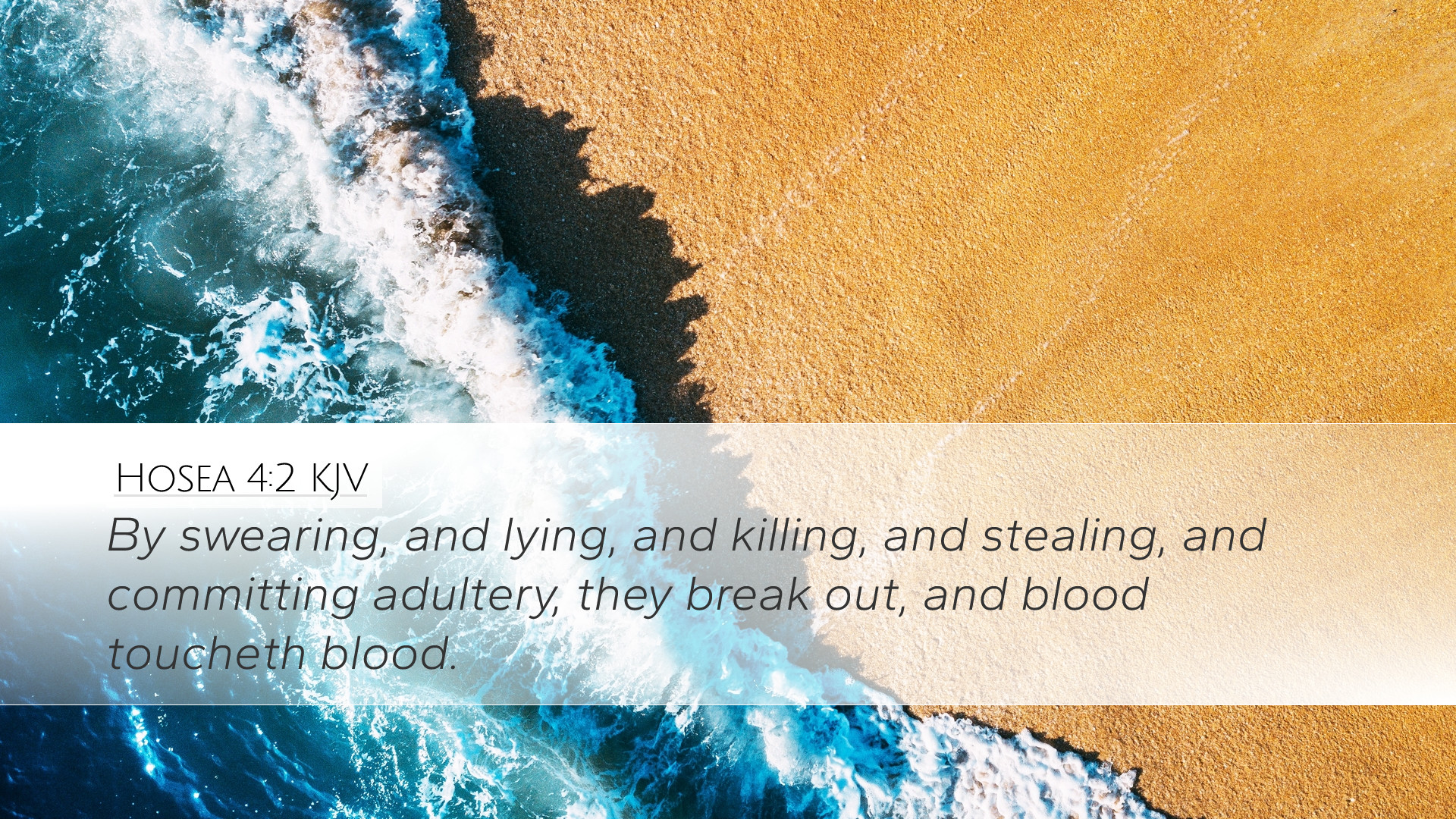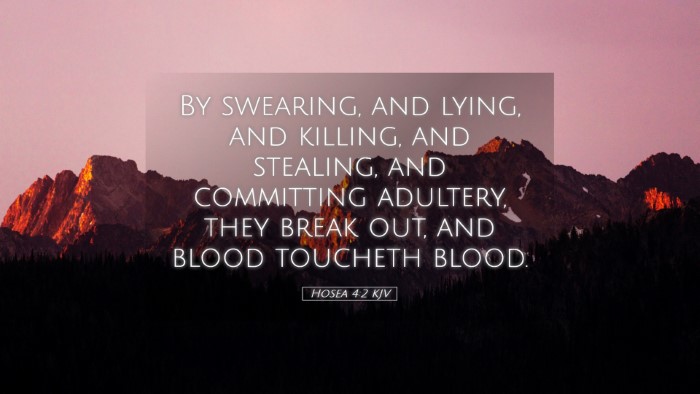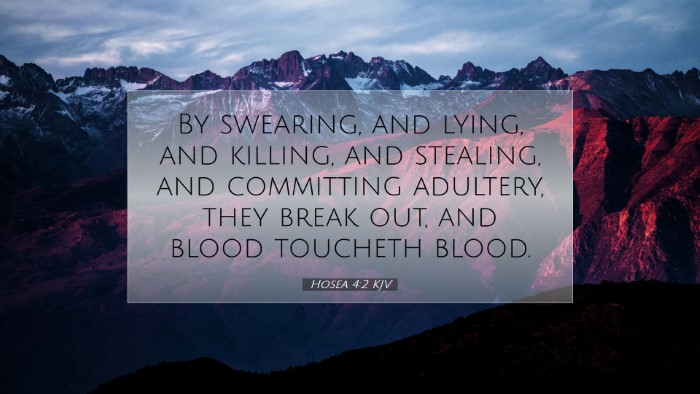Old Testament
Genesis Exodus Leviticus Numbers Deuteronomy Joshua Judges Ruth 1 Samuel 2 Samuel 1 Kings 2 Kings 1 Chronicles 2 Chronicles Ezra Nehemiah Esther Job Psalms Proverbs Ecclesiastes Song of Solomon Isaiah Jeremiah Lamentations Ezekiel Daniel Hosea Joel Amos Obadiah Jonah Micah Nahum Habakkuk Zephaniah Haggai Zechariah MalachiHosea 4:2
Hosea 4:2 KJV
By swearing, and lying, and killing, and stealing, and committing adultery, they break out, and blood toucheth blood.
Hosea 4:2 Bible Commentary
Bible Commentary on Hosea 4:2
Text of Hosea 4:2: "There is no truth, nor mercy, nor knowledge of God in the land."
Introduction
The book of Hosea serves as a poignant call to repentance and an indictment of Israel's spiritual decay. As we delve into Hosea 4:2, we find a powerful summary of the moral and spiritual condition of Israel at that time. The prophet Hosea highlights the absence of essential virtues: truth, mercy, and the knowledge of God.
Commentary Overview
This commentary draws upon the insights from renowned public domain scholars such as Matthew Henry, Albert Barnes, and Adam Clarke. Their combined observations provide a rich tapestry of understanding regarding the implications of this verse for Israel, as well as its relevance for today’s believers.
1. Absence of Truth
Matthew Henry: According to Henry, the absence of truth signifies a moral vacuum in society. Truth is foundational to a just and righteous community. In Hosea's time, lies and deceit reigned supreme, undermining the very fabric of social order.
Albert Barnes: Barnes expands on Henry's thoughts by noting that truth pertains not only to honesty in personal interactions but also to fidelity to God’s commandments. The Israelites were turning away from divine truth, seeking instead the comfort of falsehoods and idolatry.
2. Absence of Mercy
Adam Clarke: Clarke posits that mercy embodies compassion and kindness—both vital for maintaining relationships among people and towards God. He argues that the people of Israel had become hardened, exhibiting a lack of empathy for one another and a disregard for the divine mercy that had preserved them.
Matthew Henry: Henry emphasizes that without mercy, society becomes ruthless. The Israelites' neglect of mercy led to oppression and exploitation among their own people, displaying a departure from God’s character, who is, above all, merciful.
3. Absence of Knowledge of God
Albert Barnes: Knowledge of God, according to Barnes, is critical for true understanding and wisdom. Israel's ignorance was not simply a lack of information but a deliberate rejection of God’s ways. This willful ignorance led to spiritual blindness and moral chaos.
Adam Clarke: Clarke notes that knowledge of God serves as the anchor for the believer's life. Without it, individuals and nations drift into moral ambiguity and spiritual peril. He highlights that the knowledge of God brings awareness of sin and prompts repentance.
4. The Consequences of These Absences
The trifecta of truth, mercy, and knowledge of God missing from Israel is indicative of a broader spiritual malaise. The nation’s actions had dire repercussions: divine judgment was imminent, and the nation found itself estranged from the blessings available through obedience to God.
Matthew Henry: Henry warns that when truth departs, a society invites all manner of sin. The consequences will be grave, leading to suffering and eventual destruction. He stresses the need for a return to truth in society, especially among leaders.
Albert Barnes: Barnes urges that the restoration of these virtues is essential for revival. The recovery of truth, mercy, and knowledge must start at the individual level and permeate society under the guidance of the Holy Spirit.
5. Application for Today
The insights gathered from Hosea 4:2 are remarkably relevant for contemporary believers and the church today. The persistent absence of truth, mercy, and knowledge of God in various spheres—personal, communal, and global—calls for reflection and action.
- Rediscovery of Truth: The church must commit to proclaiming and living out the truth of Scripture in a world filled with relativism.
- Emphasis on Mercy: In a time of division and strife, believers are called to embody Christ's mercy in their relationships with others.
- Pursuit of Knowledge: A deeper knowledge of God through prayer, study, and community engagement can transform hearts and minds, leading to genuine revival.
Conclusion
Hosea 4:2 encapsulates a warning and a call to action that resonates through the ages. The combined insights of Matthew Henry, Albert Barnes, and Adam Clarke beckon modern readers to examine not only the text but their lives and communities in light of God's enduring truths. The pursuit of truth, mercy, and knowledge of God remains vital for spiritual restoration in any generation.


